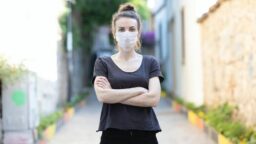A new study on thousands of health care workers at Mass General Brigham Hospitals in Massachusetts has proved that masks are effective in slowing down the spread of COVID-19. The findings of the study further validate that mandatory mask policies are necessary on college campuses and in stores, restaurants and other places where it is impossible to practice social distancing.
“While we studied health care workers, the results also apply to other situations in which social distancing is not possible. For those who have been waiting for data before adopting the practice, this paper makes it clear: Masks work,” Deepak L. Bhatt, co-author and executive director of Interventional Cardiovascular Programs at Brigham, said in a news release.
The researchers evaluated COVID-19 infection rates among Brigham health care workers before and after a universal masking policy was put in place across the entire Brigham system, which includes 12 hospitals and 78,000 employees.
The study compared the rates of COVID before the mandatory mask policy — from March 1 to March 24 — to the rates of COVID occurring in a period of time after the policy was introduced — from April 11 to April 30.
A transition period, between March 24 and April 11, was employed to account for a lag in symptoms.
They found that before the workers were required to wear masks, COVID-19 positivity rates exponentially increased from 0 percent to 21 percent. Cases were doubling every day.
After the policy was implemented, however, positivity rates linearly decreased from 15 percent to 11 percent. This decrease was happening at a time when the total case numbers in Massachusetts continued to increase.
In the paper, however, the researchers do note a couple of outside factors that may have influenced their results. During the time of their study, for example, Massachusetts had begun to implement shutdowns and social distancing measures.
During a pandemic, however, conducting a trial to test whether universal masking, alone, would account for a significant drop in cases is not feasible, according to the researchers.
“This is the most direct COVID-19 research data to this point that is based on testing of health care workers pre- and post-implementation of universal masking policies,” Dean Hashimoto, chief medical officer for Occupational Health Services at Mass General Brigham, said in the release. “When our Infection Control leaders announced a universal masking policy early in the pandemic, it was a bold move, especially at a time when, like all health systems, we were facing PPE shortages. But the results of this study demonstrate that requiring masks for all hospital staff regardless of role in the organization was critical to protecting our employees.”
Although masks are still a politicized and controversial topic in the country, mandatory mask policies are becoming widespread.
The vast majority of colleges and universities that are reopening their campuses have implemented mandatory mask policies, although some have been pressured to do so. When the University System of Georgia, for example, didn’t mandate masks on campus, the system was quickly criticized and petitions were lodged by students, professors and community members. Now, all 26 public colleges and universities in Georgia have mandated masks.
Currently, as COVID-19 cases are increasing in many states, 21 states have mandated masks in public places, and 47 have at least some sort of mask policy in place.
Some stores, too, are adopting new mask policies. On July 15, Walmart announced that it will require customers to wear masks in all of its stores and affiliates, including Sam’s Club, effective July 20.



